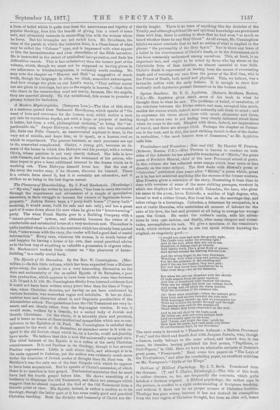Troubadours and Trouveres ; New and Old. By Harriet W.
Preston. (Roberts, Boston, U.S.)—Miss Preston is known to readers on both sides of the Atlantic for her admirable translation of " Mirbio," the great poem of Frdthirie Mistral, ohiof of the new Provencal school of poets. In this volume she has collected some essays which bear more or less directly on the same subject. The first deals with Mistral's poem of " Calemlau," published nine years after " Mireio," a poem which, great as it is, has not achieved anything like the success of the former venture. Miss Preston gives a summary of the story, illustrating it from time to time with versions of some of the more striking passages, versions in which she displays all her wonted skill. Calendau, the hero, who gives his name to the poem, loves Esterello, a maiden of high degree, who, forced to wed a robber Count, flies from him on the marriage-day, and takes refuge in a hermitage. Calendau, a fisherman by occupation, is a sort of rustic Hercules, who undertakes all manner of labours for the sake of his love, the last and greatest of all being to avenge her wrongs upon the Count. He seeks the robber's castle, tells his adven- tures in true epic fashion, and finally, after many dangers and vicissi- tudes, accomplishes his task. We give a specimen of the translator's work, which strikes us, as far as one can speak without knowing the original, as singularly good :— '1 would you once had seen the goodly sight, The OPASia men under the evening light ! And in the cool, when they put out to sea, Hundrede of fishing craft go Allontly
And lightly forth, like a great flock of plover, And spread abroad the heaving billows over.
And the wives linger in the lone doorways, Watching, with what a long and serious gaze! For the last glimmer of the swelling sail. And if the sea but (mho% they turn pale; For well they know how treacherous he is, That cruel deop,—for all his . flatteries.
But when the salt sea thunders with the shocks Of rude assault from the great equinox, And bits of foundered craft bestrew the shores, Then can we naught but close our cottage doors, And young and old about the warm fireside Watt the returning of the summer-tide.
Ah! those were evenings,—when the autumn gales Blew loud, and mother mended the rent sails With homespun thread; ay, and we youngsters too Were set to drive the needle through and through The gaping nets, and tie the meshes all There where they hung suspended on the wall.
And in his tall chair by the Ingle nook My father sat, with aye some antique book Laid reverently open on his knee.
And 'Listen, and forgebtthterai hlrne,'_equionteh.n,h dei,vine
Blew back his mark, and road some tale Of old Provencal days, y he i
The next essay is devoted to "Theodore Aubanel : a Modern Provencal Poet ;" and the third and fourth deal with Jacques Jasmin, who, though a Gomm; really belongs to the same school, and indeed was, in one sense, its founder, having published his first poems, " Papillotes, or Curl-Papers," in 1835. Here we have an admirable analysis of Jasmin's great poem, " Franconoth." Next come two papers on "Tito Lays of the Troubadours," and after the concluding paper, an excellent criticism on Mr. Tennyson's "Idylls of the Icings."






























 Previous page
Previous page